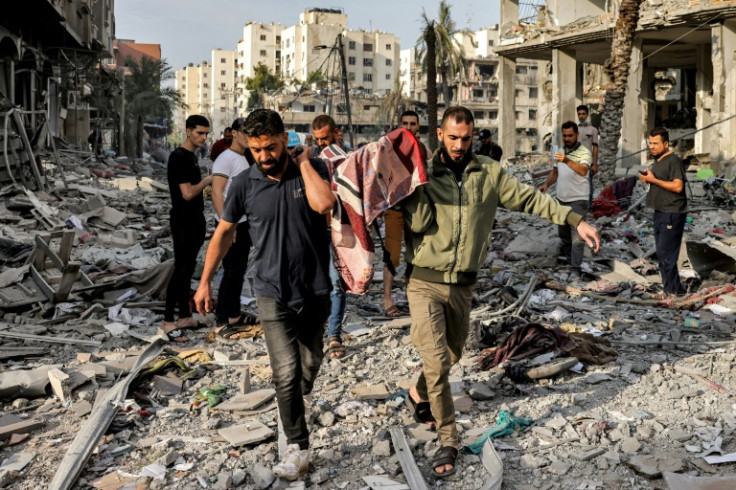Egypt Rejects Israel And US Call For Safe Corridors Out Of Gaza
With concerns regarding a mass displacement crisis erupting in Egypt and Europe, world leaders are yet to agree on a safe passage out of Gaza – where more than one million people remain trapped.

Since the Palestinian Islamist group Hamas officially took control in 2007, the 2.3 million people in the Gaza Strip have been surviving under a blockade of Israeli and Hamas occupation.
For more than a decade, Palestinian civilians have lived in a fenced-in enclave that came with faced movement restrictions, poverty and a repeated cycle of conflict.
Prior to the recent declaration of war, 80 per cent of the population were already relying on humanitarian aid services.
According to the United Nations Office for the Coordination of Humanitarian Affairs (OCHA), between January 2008 and August 2023, the relentless conflict between the Israeli Defence Force (IDF) and Hamas has killed more than 6,400 Palestinian nationals.
In less than a week, six days since Israel formally declared war on Gaza, the Gaza Ministry of Health announced that at least 1,354 people have been killed in Gaza by Israel's airstrikes.
In his speech that declared war on Hamas, Israeli Prime Minister Benjamin Netanyahu urged Palestinian nationals to flee Gaza immediately.
In a recent statement, the IDF also called for Palestinians to flee the Strip.
The IDF spokesperson said that the "Rafah crossing is still open. Anyone who can get out, I would advise them to get out".
But without legitimate authorisation and enough money, more than one million people are trapped in the enclave.
The UN also reported that at least 123,000 people have been displaced in Gaza.
The Rafah crossing, which was already disrupted by Israeli air raids this week, is controlled by Egypt and is the only crossing available to those looking to flee the region after Hamas' unprecedented attack on Israel.
Hospitals in Gaza overcrowd with dead bodies as there is no enough room nor there is a possibility for decent burial due to the constant lsraeli bombing. pic.twitter.com/nLOEXZsfqa
— TIMES OF GAZA (@Timesofgaza) October 12, 2023
Since the conflict significantly escalated on Saturday 7 October, Egypt has facilitated the influx of humanitarian aid travelling into Gaza - via the Rafah crossing.
The El Arish airport has also been adapted to be a refuge that provides critical assistance.
Yesterday, on Wednesday 11 October, both U.S. National Security Advisor Jake Sullivan and U.S. Secretary of State Antony Blinken said that there were ongoing consultations between the US, Israel and Egypt regarding a safe passage for civilians from Gaza.
However, a security source from Egypt, who asked to remain anonymous, told reporters that Egypt has rejected the idea of a safe corridor, in order to protect "the right of Palestinians to hold on to their cause and their land".
Fighting against the human injustices that the people trapped in Gaza are forced to witness, Stephane Dujarric, a spokesperson for the UN, demanded: "Civilians need to be protected. We do not want to see a mass exodus of Gazans."
With reference to the huge displacement crisis that the Israel-Gaza war is expected to bring, Egyptian Foreign Minister Sameh Shoukry argued: "Egypt was keen to open the Rafah crossing to provide humanitarian aid, food and medicine, but instability and the expansion of the conflict leads to more hardship and more refugees to safe areas, including Europe."
UK residents who have relatives and friends in Israel have also been unable to reunite with their loved ones, due to several airlines suspending all flights between the UK and Israel.
EasyJet, British Airways, Virgin Atlantic and Whizz Are made the decision to cancel all flights to the country that has also been devastated by the conflict.
Citizens and MPs have been relentlessly calling on the UK to assist them with evacuating their loved ones from both Gaza and Israel – this includes Humza Yousaf, Scotland's First Minister.
Amongst thousands of others, Yousef said that he was "sick with worry", due to his wife's parents being trapped in Gaza.
While calling the actions of Hamas "unjustifiable", Yousef explained: "Many innocent people on both sides are losing their lives and that cannot be justified in any way, shape or form."
In just six days, more than 1,200 people have been killed by Hamas in Israel. This number includes at least 30 Palestinian nationals and 22 US citizens.
17 British nationals, including children, have also been reported dead or missing in Israel.
© Copyright IBTimes 2025. All rights reserved.






















